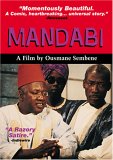| Reviews & Columns |
|
Reviews DVD TV on DVD Blu-ray 4K UHD International DVDs In Theaters Reviews by Studio Video Games Features Collector Series DVDs Easter Egg Database Interviews DVD Talk Radio Feature Articles Columns Anime Talk DVD Savant Horror DVDs The M.O.D. Squad Art House HD Talk Silent DVD
|
DVD Talk Forum |
|
|
| Resources |
|
DVD Price Search Customer Service #'s RCE Info Links |
|
Columns
|
|
|
Mandabi
The simple story is about the trouble that befalls an African man named Ibrahima who trys to cash a 25,000 franc money order that he has received from his nephew who is living in Paris. Ibrahima is a respected man in the community and while he has a house, two wives and seven children it is obvious the his family gets by with very little. But the relatively primitive community is tight knit and based and look out for each other to a degree. The main business in the area is through bartering and debt agreements; everyone seems to borrow with the promise to pay later.
The money order, of course, causes a problem because all of his relatives and vitually everyone he knows wants some of it; including the local grocer whom he is indebted to. But his real problem is that Ibrahima is unable to cash the money order because he has no ID card, and he can't get an ID card without a birth certificate and he can't get that without some kind of ID. As Ibrahima tries to get all of these he meets head on with a bureaucratic nightmare, which ends up making him more broke than he was before.
Sembene - who made this film in 1968 from a novella he wrote - very clearly is criticizing the post colonial world of the late 1960's. Specifically the unethical business world that grew out of capitalism in Africa. The man in the film is illiterate and simple and is easily manipulated by the rapacious businessmen, government workers and his own family along the way.
Mandabi is a comedy but not a laugh-out-loud one. The film has been praised because it is rooted in the culurally and politically in the African experience. Yet it has a certain pessimism and tough edge that belies an African romanticism like the kind we get from many European and Western filmmakers.
The filmmaking style is rough too. Sembene uses non professional actors who seem very real and therefore make the film that much more authentic if not sometimes a bit amateurish. Sembene also occassionally gives us a dose of realism we don't see in many movies. There is a scene early on that sets the tone for the movie. Ibrahima gets home after a shave at the barber and is brought food by one of his wives. She leaves and he quickly and noisely ingests down his meal to the point that it makes uncomfortable viewing.
Sembene may be showing us the scene because he wants us to see the cultural difference in the way people eat in Senegal. Nonetheless, it's obvious that the character is one who enjoys the small pleasure in life immensely and he is very confident and comfortable at home. Yet outside of his small world he is too naive to deal with the rapacious nature of a world that only thinks in terms of the bottom line.
Video:
The DVD is presented full frame 1.33:1 and looks poor. The film was shot in 16mm and probably never looked that great in general. It has not been restored and from the look of the image it seems to have been duped from a video tape - although it may have been transfered from a Hi Definition source. The image is dark and shows many splotches, scratches and general age.
Audio:
The DVD is presented in mono in the Wolof language with subtitles that cannot be removed. The soundtrack is spare and features a song that became a popular hit in Senegal when the film was released.
Extras:
The only extras - other than chapters - are four trailers for other New Yorker titles.
Overall:
Mandabi the film is highly recommended mainly for its story, its unique and effective style as well as its importance in African cinema. The DVD, however, does no justice to the film and I have no way of knowing whether or not New Yorker Video has any access to a better print. At least they have released it and for anyone who has even a passing interest in African cinema this is a must see film.
|
| Popular Reviews |
| Sponsored Links |
|
|
| Sponsored Links |
|
|
| Release List | Reviews | Shop | Newsletter | Forum | DVD Giveaways | Blu-Ray | Advertise |
|
Copyright 2024 DVDTalk.com All Rights Reserved. Legal Info, Privacy Policy, Terms of Use,
Manage Preferences,
Your Privacy Choices | |||||||















